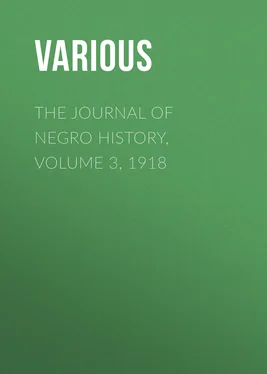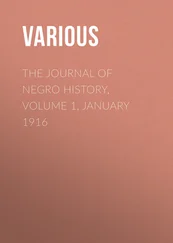Various - The Journal of Negro History, Volume 3, 1918
Здесь есть возможность читать онлайн «Various - The Journal of Negro History, Volume 3, 1918» — ознакомительный отрывок электронной книги совершенно бесплатно, а после прочтения отрывка купить полную версию. В некоторых случаях можно слушать аудио, скачать через торрент в формате fb2 и присутствует краткое содержание. Жанр: foreign_antique, periodic, История, foreign_edu, на английском языке. Описание произведения, (предисловие) а так же отзывы посетителей доступны на портале библиотеки ЛибКат.
- Название:The Journal of Negro History, Volume 3, 1918
- Автор:
- Жанр:
- Год:неизвестен
- ISBN:нет данных
- Рейтинг книги:5 / 5. Голосов: 1
-
Избранное:Добавить в избранное
- Отзывы:
-
Ваша оценка:
- 100
- 1
- 2
- 3
- 4
- 5
The Journal of Negro History, Volume 3, 1918: краткое содержание, описание и аннотация
Предлагаем к чтению аннотацию, описание, краткое содержание или предисловие (зависит от того, что написал сам автор книги «The Journal of Negro History, Volume 3, 1918»). Если вы не нашли необходимую информацию о книге — напишите в комментариях, мы постараемся отыскать её.
The Journal of Negro History, Volume 3, 1918 — читать онлайн ознакомительный отрывок
Ниже представлен текст книги, разбитый по страницам. Система сохранения места последней прочитанной страницы, позволяет с удобством читать онлайн бесплатно книгу «The Journal of Negro History, Volume 3, 1918», без необходимости каждый раз заново искать на чём Вы остановились. Поставьте закладку, и сможете в любой момент перейти на страницу, на которой закончили чтение.
Интервал:
Закладка:
There was no blemish in the entire record of his singularly active and useful life. His whole span of years appears to have been spent with a conscience void of offense, and he approached the end with a sereneness of mind well befitting the high ideals set before him. Although his body never wandered far from the place of his birth, his mind was permitted to soar through all space and to dwell in the regions of the stars and the planets. We can never know how sorely his finer spirit grieved over the tribulations that beset his blood kinsmen in the days of their bondage in this land of their birth, but we can well believe that in the loftiness of his soul he dreamed the dream of their ultimate release.
As the shadows gathered about him towards the evening of his life he abandoned those pursuits that had brought him merited distinction, and had gained for him the admiration of a host of friends chiefly among people that the world called superior. One beautiful Sabbath afternoon, in the month of October, 1806, 181while quietly resting in the shade of a tree beside his cottage on the brow of a hill that overlooked the Patapsco Valley he seemed to hear the voices that beckoned him to the other world. And as if stirred by some sudden impulse he rose and made an effort to walk once more along the paths that had so often been his quiet retreat in the moments of his deep reflections. He had not gone far, when his strength gave way, and he sank helpless to the ground. He was assisted back to his home by a friendly neighbor, but the noon of his day having fully merged into the evening, the dark shadows of Eternal Night settled over him.
Directly after Banneker's death, in fact, on that very day, his sisters, Minta Black and Mollie Morton, undertook to carry out his wishes with respect to the disposition to be made of his personal effects. Banneker had, a few years before, directed that "all the articles which had been presented to him by George Ellicott, consisting of his books and mathematical instruments, and the table on which he made his calculations should be returned as soon as he should die." 182He also requested that "as an acknowledgment of a debt of gratitude for Ellicott's long-continued kindness he should be given a volume of the manuscripts containing all his almanacs, his observations on various subjects, his letter to Thomas Jefferson, and the reply of that statesman." All the rest that he possessed was left to the two sisters. It was due to the faithful execution of his wishes on the very day of his death that his valuable manuscripts were preserved at all. They were all carried to George Ellicott, and this circumstance was the first notice that Ellicott received of the passing away of his friend. "Banneker's funeral took place two days afterward, and while the ceremonies were in progress at his grave, his home took fire and burned so rapidly that nothing could be saved." 183
Some time before his death Banneker gave to one of his sisters the feather bed on which he usually slept, and this she preserved as her only keepsake of him. Years after wards she had occasion to open the bed and, feeling something hard among the feathers, she discovered that it was a purse of money. This circumstance shows that Banneker was not "in the evening of his life overshadowed by extreme poverty." 184
In an excellent paper read on April 18, 1916, before the Columbia Historical Society of Washington, by Mr. P. Lee Phillips, of the Library of Congress, Banneker's Almanac was compared with Benjamin Franklin's Poor Richard's Almanac. Mr. Phillips also referred to his efforts in behalf of peace and to the friendship that existed between Banneker and such distinguished men of his time as Washington and Jefferson. He closed his article on Banneker with the broad-minded declaration that "Maryland should in some manner honor the memory of this distinguished citizen, who, notwithstanding the race prejudice of the time, rose to eminence in scientific attainments, the study of which at that early date was almost unknown." 185The recognition of Douglass in Rochester and Boston, Pushkin in Petrograd and Moscow and Dumas in Paris, affords splendid suggestions of what we hope to see of Banneker in Baltimore. It is a sad reflection on the people of this country that practically nothing has been done to honor this distinguished man.
Henry E. Baker Assistant Examiner, United States Patent Office.GEORGE LIELE AND ANDREW BRYAN, PIONEER NEGRO BAPTIST PREACHERS
Without any consideration of the merits or demerits of what is called the exceptional man theory, perhaps no two men stand out more prominently in the early history of the Negro church than George Liele and Andrew Bryan. In the days of darkest forebodings and of the greatest human sufferings these two pioneers of religion went forth to disseminate ideas and mold sentiments which were to shape the inner springs of conduct of their fellow-slaves. Sketches of these heroes must claim the attention of seekers for the truth as to this important phase of our history.
A letter dated September 15, 1790, from the late Reverend Mr. Joseph Cook of Euhaw, upper Indian Land, South Carolina, says: "A poor Negro, commonly called, among his friends, Brother George, 186has been so highly favored of God, as to plant the first Baptist Church in Savannah, and another in Jamaica." This man was George Liele. He was born in Virginia about 1751. He knew very little of his mother, Nancy, but was informed by white and black that his father was a very devout man. The family moved much during the youth of George, but finally settled in Georgia.
As a youth George Liele had a natural fear of God, holding constantly in mind His condemnation of sin. Liele was converted through the preaching of the Reverend Matthew Moore, 187who later baptized him. Desiring then to prove the sense of his obligations to God, Liele began to instruct his own people. Crude but firm in purpose, he soon showed ministerial gifts and after a trial sermon before a quarterly meeting of white ministers was licensed as a local preacher. He practiced preaching on different plantations, and in the church to which he belonged, on evenings when there was no regular service. After a short period he began his regular ministerial work, serving about three years at Brunton Land, and at Yamacraw, where developed a number of useful communicants. 188
Among these early members of the Yamacraw church were Reverend David George, who later labored, with permission from the Governor, in the ministry at Nova Scotia, with sixty communicants, white and black; Reverend Amos, who preached with good results at New Providence, one of the Bahama Islands, to about three hundred members; and Reverend Jesse Gaulsing, who preached near Augusta, in South Carolina to sixty members. Preaching later from Chapter III Saint John, and the clause of verse 7, "Ye must be born again," George Liele moved to repentance a more useful man, Andrew Bryan, and a noted woman named Hagar. 189After Liele organized this influential church at Yamacraw, then a suburb of Savannah, Mr. Henry Sharp, his master, encouraged this pioneer by giving him his freedom.
Mr. Sharp was an officer in the war and died from wounds received in the King's service. 190Soon after the death of Mr. Sharp there arose those who were dissatisfied with George's liberation. He was taken and thrown into prison, but by producing his manumission papers was released. To extricate himself from this unpleasant situation Liele became obligated to a Colonel Kirkland. At the evacuation of Savannah by the British he was partly obliged to come to Jamaica, as an indentured servant for money he owed Colonel Kirkland, who promised to be his friend in that country. Upon landing at Kingston he was upon the recommendation of the Colonel to General Campbell, the Governor of Jamaica, employed by him two years, and, on leaving the island, the governor gave Liele a certificate of his good behavior. As soon as Liele had paid his debt to Colonel Kirkland, he obtained for himself and family a certificate of freedom from the vestry and governor, according to the law of this Island. 191Thus by force of circumstances George Liele was compelled to leave those among whom he had labored so effectively and thrown into another field where he had opportunity for further service.
Читать дальшеИнтервал:
Закладка:
Похожие книги на «The Journal of Negro History, Volume 3, 1918»
Представляем Вашему вниманию похожие книги на «The Journal of Negro History, Volume 3, 1918» списком для выбора. Мы отобрали схожую по названию и смыслу литературу в надежде предоставить читателям больше вариантов отыскать новые, интересные, ещё непрочитанные произведения.
Обсуждение, отзывы о книге «The Journal of Negro History, Volume 3, 1918» и просто собственные мнения читателей. Оставьте ваши комментарии, напишите, что Вы думаете о произведении, его смысле или главных героях. Укажите что конкретно понравилось, а что нет, и почему Вы так считаете.












